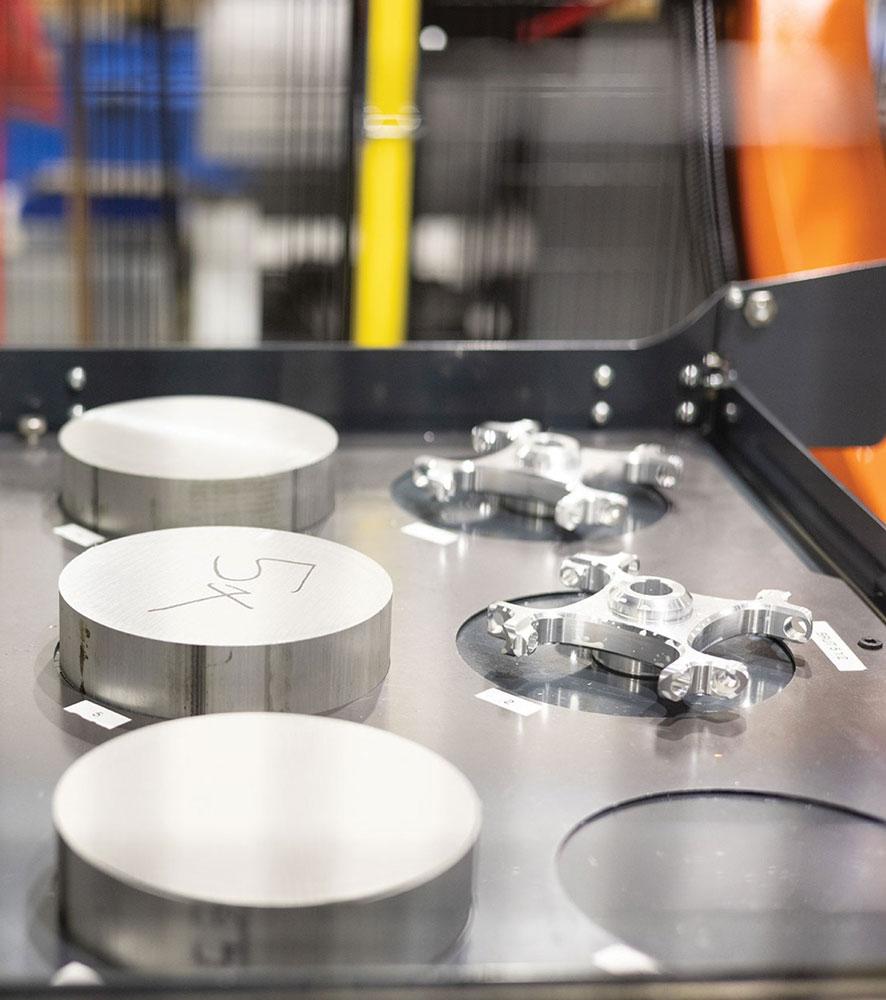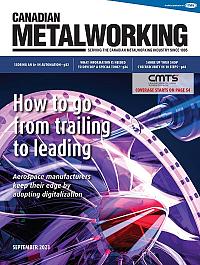- FMA
- The Fabricator
- FABTECH
- Canadian Metalworking
Scoring an A+ in automation
Précinov specializes in complex, multisided machining of precision parts
- October 18, 2023
- Article
- Metalworking
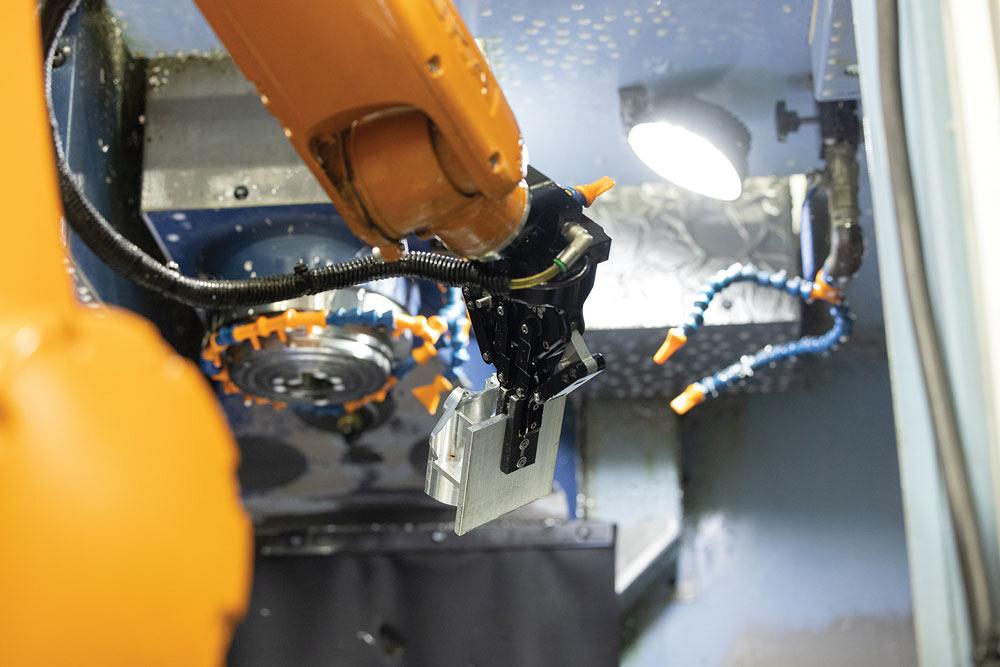
Each machining cell has a manipulator system and adaptive robotic gripper that flips the part to machine all of its sides without removing it from the machine tool. Images: Precinov
Situation
At precision machine shop Précinov, Lévis, Que., low-volume/high-mix job production requires fast setups and changeovers to maximize efficiency.
While the company considered automation as a way to achieve its production goals, it discovered that implementing automation, depending on the chosen type, is time-consuming and complicated.
Précinov specializes in manufacturing of small, complex, high-precision parts, mainly for customers in the opto-mechanics, robotics, medical, electronics, and energy industries. It also provides integrated services for mass production of parts, prototyping, and computer-aided mechanical design. Job lot sizes vary from a handful of parts to sometimes 1,000 pieces, machined mostly from aluminum but also from stainless steels, plastics, exotic materials, and copper.
The shop operates a two-tiered business; working both as job shop manufacturing parts to order, while also building parts for inventory to enable immediate fulfillment of orders from repeat customers. It operates 24 hours a day and on weekends. Each day’s first shift is manned, while evening and overnight shifts run lights-out thanks to its machine tending automation.
During the first shift, shop personnel run small jobs that don’t require automation and set up jobs to be run unattended on the second and overnight shifts. Because the shop does not produce long runs of identical parts, Précinov’s owner Mathieu DeBlois wanted automation that was flexible and quick to set up.
It was at that point he decided to take an innovative approach to keep pace with production demands and incorporate stand-alone automated machine tending cells.
Resolution
Eight of the shop’s 12 machine tools are automated systems, with five of these using PartNR systems engineered by Waybo, a Mirabel, Que.-based company that specializes in the design and implementation of industrial automation systems.
Just like other shops nationwide, Précinov is experiencing an ongoing shortage of experienced shop personnel. It’s one of the reasons it chose to automate.
“We don’t want to waste our skilled individuals, using them to load and unload a machine. We need their brains for setting up machines,” explained DeBlois.
Précinov’s Waybo machine tending cells incorporate robots from KUKA Robotics. The shop has five KUKA robots, including three AGILUS units with 10-kg maximum capacity, a KR20 CYBERTECH robot with 23.9-kg maximum payload and 1,813-mm reach, and a KR22 CYBERTECH with up to 27.3-kg maximum payload and 1,612-mm reach. The 6-axis AGILUS robots are designed for high working speeds and precision. The CYBERTECH robots were chosen for their power density from a large set of models.
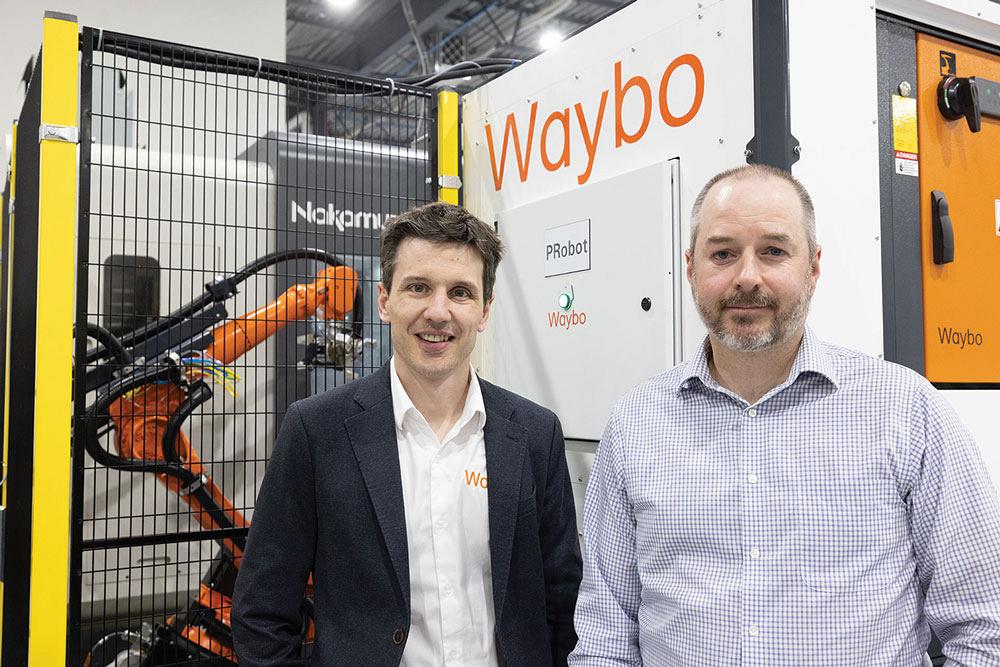
Waybo President Jean-Sébastien Neveu (left) helped Précinov Owner Mathieu DeBlois automate his shop’s machining cells to maximize efficiency, even in high-mix/low-volume production runs.
Waybo’s pre-engineered, turnkey PartNR machine tending cells are specifically designed for low-volume, high-mix applications. Compact (1 m by 1.28 m by 2.2 m) and easy to program, the cells have manipulator systems and adaptive robotic grippers that enable Précinov to flip a part and machine all of its sides without removing it from the machine tool.
“Even if it’s on a multitasking machine, lathe, or 3-, 4-, or 5-axis machines, we flip the parts,” DeBlois said. “When the part is done, we ship it to the customer complete and without needing secondary operations. Flipping a part has to be accurate to maintain tolerances, and the KUKA robots are very precise. Any robot can do a first operation on a blank of raw material, but flipping the part and remaining precise is a different challenge.”
Each machining cell in the shop has its own automation setup and is independent of the other cells. Précinov did not pursue the idea of using one robot to service several machines because taking a machine out of operation for part changeover, maintenance, and breakdowns would then affect the entire system.
“By using a robot on each machine, it is easier for planning, and Précinov can run whatever it wants, quickly,” said Waybo President Jean-Sébastien Neveu. “The shop employs 25 people, and the Waybo automation enables seven operators to keep the shop’s 12 machines working 24-7.”
KUKA robots are easy to understand and program, said DeBlois.
“The robot does not add to setup time,” he explained. “The longest part of the setup is not the robot, it’s the CNC machine.”
To further expedite programming, the robots extract information from the shop’s CAM programming system regarding part sizes, vises, fixtures, and obstructions in the machine.
The most important advantage of using multiple robots is ease of setup and the ability to respond quickly to changing customer demands. Using the same robots throughout the shop simplifies employee training and shifting staff from machine to machine.
Précinov plans to expand its utilization of machining and programming data to help the shop further improve its production planning and machine maintenance. With the majority of its work occurring unattended, the biggest challenge is ensuring process security when the shop is operating lights out.
This requires both simplicity and reliability in its robots and machine tending cells so it can run an operation that is a completely unattended operation.
Précinov, www.precinov.com
KUKA, www.kuka.com
Waybo, www.waybo.com
Related Companies
subscribe now


Keep up to date with the latest news, events, and technology for all things metal from our pair of monthly magazines written specifically for Canadian manufacturers!
Start Your Free Subscription- Trending Articles
Automating additive manufacturing
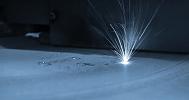
Sustainability Analyzer Tool helps users measure and reduce carbon footprint

CTMA launches another round of Career-Ready program
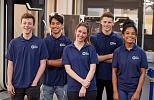
Sandvik Coromant hosts workforce development event empowering young women in manufacturing

GF Machining Solutions names managing director and head of market region North and Central Americas

- Industry Events
MME Winnipeg
- April 30, 2024
- Winnipeg, ON Canada
CTMA Economic Uncertainty: Helping You Navigate Windsor Seminar
- April 30, 2024
- Windsor, ON Canada
CTMA Economic Uncertainty: Helping You Navigate Kitchener Seminar
- May 2, 2024
- Kitchener, ON Canada
Automate 2024
- May 6 - 9, 2024
- Chicago, IL
ANCA Open House
- May 7 - 8, 2024
- Wixom, MI













